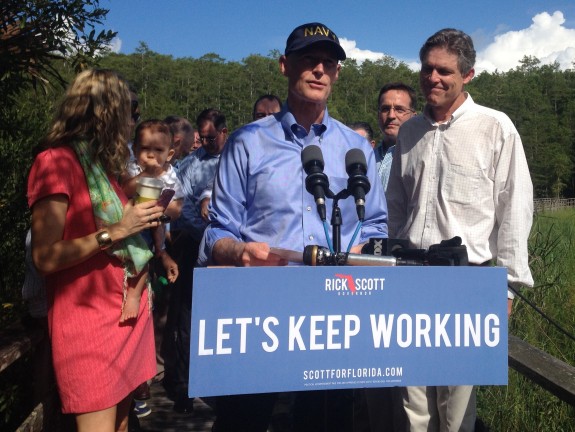
Gov. Rick Scott lays out his environmental plan during re-election campaign. (Photo by Topher Forhecz/WGCU)
By Ashley Lopez
Florida Center for Investigative Reporting
After years of dealing blows to state environmental agencies and regulations, Gov. Rick Scott recently announced an ambitious environmental agenda aimed at protecting Florida’s land and water.
During recent trips throughout the state, Scott has begun touting his new plan, which is a radical departure from what he has implemented during his time in office.
As Craig Pittman with The Tampa Bay Times reported:
For instance, when Scott signed his first budget in 2011, he vetoed the entire $305 million annual appropriation for Florida Forever, the state’s politically popular environmental land-buying program that, among other things, saved areas important for recharging the underground aquifer, the main source of Florida’s drinking supply. In that first year, Scott also cut $700 million from the budgets of the state’s water management districts, which oversee withdrawals from the aquifer and issue permits for filling wetlands.
Now Scott says he wants to spend $150 million a year for Florida Forever. But instead of solely focusing on buying environmentally sensitive forests, beaches and wetlands, his plan says that money would be spent to “protect and take care of working agricultural landscapes,” listing that buyout for beleaguered farmers and ranchers first, before parks and conservation land. His plan gives no further details.
In fact, the cuts to Florida Forever were so deep and alarming to environmentalists, that a group of environmental organizations got together and successfully put a constitutional amendment on this year’s ballot.
Back in early 2013, I reported for WGCU that environmental groups cited how hard it has been to get money for land conservation in the state budget as the major reason they sought a ballot measure.
As WGCU reported:
Eric Draper, the president of Florida’s Audubon Society, takes part in lobbying state lawmakers every year to give conservation programs more money. He says efforts have not been fruitful.
“We reached a point where the Legislature stopped listening,” Draper says. “And we reached a point where the results of our lobbying activities were less and less funds in the appropriations bill. And part of that was due to the economic down-crease. But even right now we take a head count of legislators and we don’t see the commitment to environmental spending that you would expect.”
That’s why environmental groups are sort of bypassing the legislature.
A constitutional amendment allows them to collect the signatures of Florida residents– instead of fighting for a bill in the Legislature or lobbying lawmakers every year for the money.
If passed, the amendment would set aside one third of the money collected by the state from real estate transactions and put it into a trust fund that would go to programs like Florida Forever.
Even in this year’s budget, which was crafted during a surplus, lawmakers did not set aside nearly as much money as they used to.
Pittman also notes via the Times:
In 2011, Scott’s Department of Environmental Protection ended a springs restoration initiative launched by former Gov. Jeb Bush. Under Scott’s plan, he’s promising to spend $500 million on springs over 10 years — though that’s six years longer than Scott would be in office, if re-elected.
In 2011, Scott also cut $700 million from the budgets of the state’s water management districts, which oversee protection of the aquifer and providing money for finding alternative sources for water besides pumping it from the ground. The Southwest Florida Water Management District, for instance, helped pay for Tampa Bay Water’s reservoir and desalination plant.
Now Scott’s plan calls for “a 10-year, $500 million funding program for alternative water supply investment that requires an applicant to meet water conservation benchmarks to qualify for funding.” The plan offers no further details of what that might mean, or how Scott would guarantee the program would continue after his second term ends.
Scott’s new plan also promises more state regulatory action—namely, more penalties against polluters.
This new commitment follows an incident in Southwest Florida where an oil company proceeded with a fracking-like drilling operation without final approval from the Florida Department of Environmental Protection (DEP).
However, during Scott’s time in office the state’s main environmental agency has gone through some big changes.
One, DEP’s staff is significantly smaller than it used to be. Two, the state has fewer environmental regulations in place. Scott and the Legislature slashed various environmental regulations as part of the state’s pro-business agenda.
In 2013, Scott signed a bill that was fiercely opposed by environmentalists because it relaxed a slew of environmental laws and permitting rules in the state.
As WGCU noted back then, that bill was signed around the same time DEP made some significant staff changes:
At the same time Scott changed the rules for environmental permitting, the Florida Department of Environmental Protection (DEP) went through another round of layoffs.
According to The Orlando Sentinel, Christopher Byrd and Kelly Russel “were fired last month by DEP General Counsel Matthew Leopold in identical letters notifying them the office’s goals would be ‘accomplished more effectively by removing you from your positions.’” The Sentinel reported that two other lawyers also resigned, “and one suggested it wasn’t by choice”:
The firings eventually prompted a state lawmaker to call for an investigation.
A report also found that since Scott appointed the state’s current DEP chief, the agency has been working on much fewer cases.
Besides all this, of course, Scott’s comments on climate change have also upset environmentalists. In fact, Scott’s take on the issue has even prompted a massive campaign aimed on ousting him based on the issue of global warming alone.
As of late, though, Scott has touted Everglades restoration and other environmental projects as some of his big priorities if he were re-elected.
